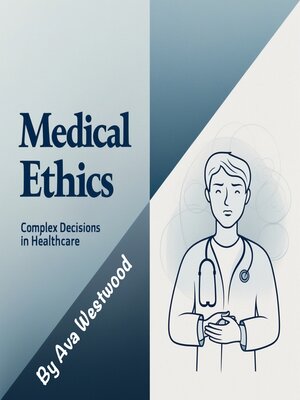
Sign up to save your library
With an OverDrive account, you can save your favorite libraries for at-a-glance information about availability. Find out more about OverDrive accounts.
Find this title in Libby, the library reading app by OverDrive.



Search for a digital library with this title
Title found at these libraries:
| Library Name | Distance |
|---|---|
| Loading... |
Medical ethics is the backbone of modern healthcare, ensuring that medical professionals navigate complex decisions with integrity, compassion, and fairness. It establishes the moral principles that guide patient care, medical research, and public health policies, preventing harm and promoting trust in the healthcare system. Without ethical guidelines, advancements in medicine could lead to exploitation, inequities, and violations of human rights, undermining the fundamental purpose of healthcare.
The principles of medical ethics—autonomy, beneficence, non-maleficence, and justice—form the foundation of ethical decision-making in medicine. Autonomy protects a patient's right to make informed choices about their own healthcare, emphasizing the importance of consent. Beneficence compels medical professionals to act in the best interests of their patients, while non-maleficence ensures that harm is minimized. Justice mandates fair and equal treatment for all patients, addressing issues of healthcare access and resource distribution. These principles help balance the rights of individuals with the broader responsibilities of medical institutions and practitioners.
Historical failures in medical ethics serve as stark reminders of what happens when ethical principles are ignored. The Tuskegee Syphilis Study, in which African American men were denied proper treatment for syphilis without their knowledge, remains one of the most egregious violations of patient rights. Similarly, the case of Henrietta Lacks, whose cells were taken without consent and used for groundbreaking research, highlights ethical concerns surrounding patient autonomy and medical consent. These cases have driven reforms in medical ethics, leading to stricter regulations and the establishment of review boards to oversee research practices.







